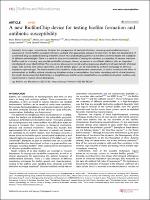A new BiofilmChip device for testing biofilm formation and antibiotic susceptibility

Author
Date
2021-08-03Permanent link
https://hdl.handle.net/11351/7339DOI
10.1038/s41522-021-00236-1
ISSN
2055-5008
WOS
000680904200001
PMID
34344902
Abstract
Currently, three major circumstances threaten the management of bacterial infections: increasing antimicrobial resistance, expansion of chronic biofilm-associated infections, and lack of an appropriate approach to treat them. To date, the development of accelerated drug susceptibility testing of biofilms and of new antibiofouling systems has not been achieved despite the availability of different methodologies. There is a need for easy-to-use methods of testing the antibiotic susceptibility of bacteria that form biofilms and for screening new possible antibiofilm strategies. Herein, we present a microfluidic platform with an integrated interdigitated sensor (BiofilmChip). This new device allows an irreversible and homogeneous attachment of bacterial cells of clinical origin, even directly from clinical specimens, and the biofilms grown can be monitored by confocal microscopy or electrical impedance spectroscopy. The device proved to be suitable to study polymicrobial communities, as well as to measure the effect of antimicrobials on biofilms without introducing disturbances due to manipulation, thus better mimicking real-life clinical situations. Our results demonstrate that BiofilmChip is a straightforward tool for antimicrobial biofilm susceptibility testing that could be easily implemented in routine clinical laboratories.
Keywords
Biofilms; Clinical microbiology; Infectious-disease diagnosticsBibliographic citation
Blanco-Cabra N, López-Martínez MJ, Arévalo-Jaimes BV, Martin-Gómez MT, Samitier J, Torrents E. A new BiofilmChip device for testing biofilm formation and antibiotic susceptibility. NPJ Biofilms Microbiomes. 2021 Aug 3;7:62.
Audience
Professionals
This item appears in following collections
- HVH - Articles científics [4476]
The following license files are associated with this item:

 Private area
Private area Contact Us
Contact Us






